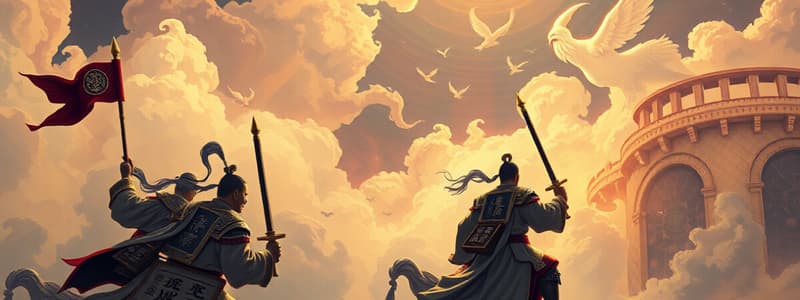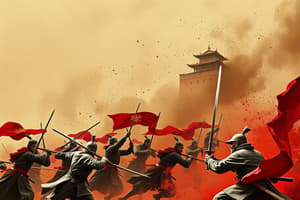Podcast
Questions and Answers
Discuss the irony in this statement: "To secure ourselves against defeat lies in our own hands, but the opportunity of defeating the enemy is provided by the enemy himself."
Discuss the irony in this statement: "To secure ourselves against defeat lies in our own hands, but the opportunity of defeating the enemy is provided by the enemy himself."
If you have a good defense, you will survive attacks. If you have a weak defense, then even a moderate attack may well succeed. The same is true for your enemy. Understand their defense to know how hard or easy it will be to defeat them.
How would Sun Tzu respond to Phillip Fulmer's statement about intensity and intimidation in football?
How would Sun Tzu respond to Phillip Fulmer's statement about intensity and intimidation in football?
What the ancients called a clever fighter is one who not only wins, but excels in winning with ease. Hence his victories bring him neither reputation for wisdom nor credit for courage.
What, essentially, is 'true excellence'?
What, essentially, is 'true excellence'?
True excellence is when we win our 'battles' without any mistakes. It's when we don't expect to win just for the honor and glory.
What are direct methods of fighting? What are indirect methods?
What are direct methods of fighting? What are indirect methods?
Explain the sentence, '[...] the good fighter will be terrible in his onset, and prompt in his decision.' What is the effect of the phrase 'terrible in his onset'?
Explain the sentence, '[...] the good fighter will be terrible in his onset, and prompt in his decision.' What is the effect of the phrase 'terrible in his onset'?
Discuss this sentence: "Simulated disorder postulates perfect discipline; simulated fear postulates courage; simulated weakness postulates strength." What is the effect of the repetition?
Discuss this sentence: "Simulated disorder postulates perfect discipline; simulated fear postulates courage; simulated weakness postulates strength." What is the effect of the repetition?
Why does a 'clever combatant' not 'demand perfection from the untalented'?
Why does a 'clever combatant' not 'demand perfection from the untalented'?
How is the paragraph beginning with 'An army may march great distances [...]' related to the title of the chapter?
How is the paragraph beginning with 'An army may march great distances [...]' related to the title of the chapter?
Discuss the implications of this sentence: 'If he sends reinforcements everywhere, he will everywhere be weak.'
Discuss the implications of this sentence: 'If he sends reinforcements everywhere, he will everywhere be weak.'
Discuss the analogy between water and the soldier.
Discuss the analogy between water and the soldier.
Flashcards are hidden until you start studying
Study Notes
Irony of Defeat
- Defense determines survival; strong defense withstands attacks, while weak defense invites failure.
- Understanding the enemy's defense helps assess victory chances.
Intensity in Competition
- Phillip Fulmer emphasizes player intensity and physical conditioning to intimidate opponents.
- Sun Tzu would argue that true skill lies in winning effortlessly, without seeking glory.
True Excellence Defined
- True excellence is achieving victory without mistakes, devoid of glory-seeking motivations.
Fighting Methods
- Direct methods are characterized as hard, obvious, and expected (yang, cheng).
- Indirect methods are soft, subtle, and surprising (yin, chi).
Timing and Momentum
- A successful fighter must begin with good timing and maintain momentum.
- Continuous practice improves a fighter's skills and effectiveness.
Simulated Strength
- The repetition of "simulated" emphasizes a test-like quality for showing discipline and strength.
- Parallel structure indicates a fighter's ability to transform weaknesses into strengths.
Clever Combatant
- A clever combatant values collective energy over perfection from individuals.
- This leader identifies suitable roles for each team member to maximize effectiveness.
Army Movement
- An army can move efficiently without distress if it avoids enemy territory.
- The relationship to "Weak Points and Strong" highlights stress associated with enemy presence.
Reinforcement Strategy
- Dispersing reinforcements across conflicts leads to overall weakness in defense and effectiveness.
Water and Soldiers Analogy
- Water adapts to terrain; soldiers must respond dynamically to the conditions posed by their adversaries.
- Strategy involves finding optimal paths and opportunities for victory in battle.
Studying That Suits You
Use AI to generate personalized quizzes and flashcards to suit your learning preferences.




